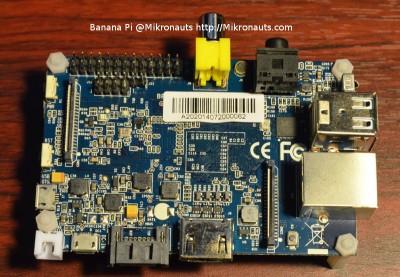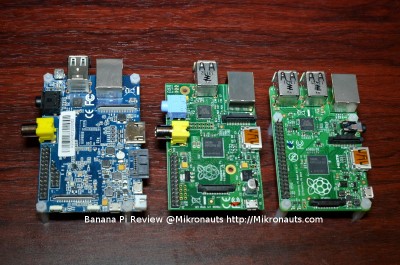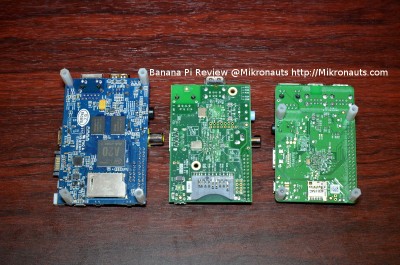Banana Pi Review
“Imitation is the sincerest [form] of flattery” (Charles Caleb Colton (1780–1832))
If Charles was right, the Raspberry Pi Foundation should be very flattered!
(click on image for a larger version)
As a baby boomer who grew up during the personal computer revolution, the Raspberry Pi “cloning” seems very familiar to me…
“Compaq was founded in 1982 by Joseph R. (“Rod”) Canion, James M. Harris, and William H. Murto, all former employees of Texas Instruments Incorporated, for the purpose of building a portable computer that could use all of the software and peripheral devices (monitors, printers, modems) created for the IBM Personal Computer (PC).” (Encyclopaedia Britannica, Compaq Computer Corporation, 2014)
You could say that the success of the Raspberry Pi just might be starting a second computer revolution.
Is the Banana Pi trying to hitch a ride on the Raspberry Pi’s success?
YES
Is that necessarily a bad thing though?
- The Raspberry Pi leverages Broadcom’s expertise in mobile ARM SOC’s, as well as Linux, which has been ported to every possible chip it can run on.
- The Banana Pi leverages Allwinner’s A20 SOC for tablets, as well as Linux. Granted, they are also modifying Raspbian, however Raspian IS open source software.
Software compatibility, as far as it is reasonably feasible, is generally a good thing, and benefits buyers of both systems.
As I am NOT a lawyer (nor do I play one on TV) I will not spend a lot of time considering if the words “Banana Pi” violate the Raspberry Pi Foundation’s trademark on “Raspberry Pi”, and nothing I write in this review is to be construed as legal advice (because it is not).
As a layman, I will just note that “Pi” is a standard name for a mathematical quantity, and that “banana” does not sound like “raspberry” (nor does it look like one). I think if anyone is ill-advised enough to come out with a “Blueberry Pi”, “Strawberry Pi”, “Blackberry Pi”, a much stronger case could be made for the presence of a trademark violation.
FYI, I was not paid by anyone to write this review, and I purchased all of the boards being tested, and all test equipment myself to avoid any perception of potential bias.
Does the Banana Pi look like a Raspberry Pi?
(click on image for larger version)
Left to right: Banana Pi, Raspberry Pi Model B, Raspberry Pi Model B+
Yep, it does look simlar, but definitely not identical. Given Lemaker’s desire that BPi’s be able to use RPi’s add-on’s, that is to be expected. Even then there are clear differences – more connectors, slightly larger pcb, different mounting holes – but it sure looks similar.
Does that violate anything? Who knows.
(Compaq and IBM had similar disagreements over the ISA bus, and IBM’s response – the microchannel – flopped)
(click on image for larger version)
Left to right: Banana Pi, Raspberry Pi Model B, Raspberry Pi Model B+
The bottom of the Banana Pi looks quite different – note the Allwinner A20 processor, and the two memory chips
Frankly, I care about the technical capabilities and support available for the boards, not (potential) arguments between legal beagles on slight technicalities.
Review Index
Page 1: Introduction, Does it look the same?
Page 2: Closer Look, Feature Comparison
Page 3: Operating Systems, Software Compatibility
Page 4: WiringPi, RPi.GPIO, Hardware Compatibility
Page 5: More board compatibility test results
Page 6: USB WiFi stick Compatibility, Documentation, Benchmarks
Page 7: Power Utilization, Support, Conclusion


